Current Call
There are no calls open, now.
Accomplished STSMs
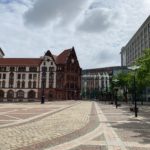
Lena Junger (Austria, supported by the HR21 Doctoral School, BOKU Vienna) will spend two months at TU Dortmund working together with Thomas Hartmann and Peter Davids on the topic of resilient recovery. The aim is to conduct interviews with stakeholders involved in the recovery process after the extreme flood events in July 2021 in Germany.
The results will be published in a joint paper.
 Maria Viota (Spain) traveled to Serbia to explore the potentiality of urban green infrastructure (UGI), ecosystem services (ES) and nature-based solutions (NBS) in protecting cities, with an emphasis on urban planning. The attention of the mission was paid to the role of UGI in urban planning and its promising opportunities for facing many risks posed by climate change. She cooperated with Prof. Dragan Milosevic.
Maria Viota (Spain) traveled to Serbia to explore the potentiality of urban green infrastructure (UGI), ecosystem services (ES) and nature-based solutions (NBS) in protecting cities, with an emphasis on urban planning. The attention of the mission was paid to the role of UGI in urban planning and its promising opportunities for facing many risks posed by climate change. She cooperated with Prof. Dragan Milosevic.
 Karolina Kolasinska (Poland) cooperated with Prof. Silvia Kohnova (Slovak University of Technology Bratislava) to determine the flood indexes of the CN method for the small catchment areas and to run water cycle simulations. The cooperation will result in join publications.
Karolina Kolasinska (Poland) cooperated with Prof. Silvia Kohnova (Slovak University of Technology Bratislava) to determine the flood indexes of the CN method for the small catchment areas and to run water cycle simulations. The cooperation will result in join publications.
 Jan Brabec (Czechia) visited Regional Centre for Energy Policy Research at Corvinus University of Budapest to explore factors affecting Balkan farmers’ willingness to implement flood mitigation measures on private land and to purchase flood insurance products. Econometric modelling was run to test literature review variables.
Jan Brabec (Czechia) visited Regional Centre for Energy Policy Research at Corvinus University of Budapest to explore factors affecting Balkan farmers’ willingness to implement flood mitigation measures on private land and to purchase flood insurance products. Econometric modelling was run to test literature review variables.
Results will be presented to the international audience and join paper will be prepared.
 Marek Hekrle (Czechia) visited University of Lisbon in Portugal to work on comparison of economic assessments of nature-based solutions for flood protection in Czech Republic and Portugal.
Marek Hekrle (Czechia) visited University of Lisbon in Portugal to work on comparison of economic assessments of nature-based solutions for flood protection in Czech Republic and Portugal.
During the STSM, this joint paper was drafted in the form of outline and summary, titled ´Economic assessment of green roofs: A comparison between Czech and Portuguese methodological approaches´.
 Adam Krajewski (Poland) spent two weeks working with Nejc Bezak (University of Ljubljana) investigating impact of rainfall interception due to urban greenery on flood generation. Obtained results confirm significant role of urban greenery in runoff generation and flood risk reduction.
Adam Krajewski (Poland) spent two weeks working with Nejc Bezak (University of Ljubljana) investigating impact of rainfall interception due to urban greenery on flood generation. Obtained results confirm significant role of urban greenery in runoff generation and flood risk reduction.
The output of the STSM will be presented at conference in a form of a poster and will form a basis for a joint publication.
 Zuzana Nemetova (Slovakia) cooperated with Prof. Kazimierz Banasik from Warsaw University of Life Sciences. They worked on mathematical modelling of soil degradation processes and evaluation of flood protection measures within the territory of Poland and the Slovak Republic. The results from EROSION-3D model consisted of map and tabular outputs reflecting various erosion and transport processes (amount of runoff, sediment mass, sediment concentration, erosion, net erosion and sediment deposition). The results obtained will be published in the article.
Zuzana Nemetova (Slovakia) cooperated with Prof. Kazimierz Banasik from Warsaw University of Life Sciences. They worked on mathematical modelling of soil degradation processes and evaluation of flood protection measures within the territory of Poland and the Slovak Republic. The results from EROSION-3D model consisted of map and tabular outputs reflecting various erosion and transport processes (amount of runoff, sediment mass, sediment concentration, erosion, net erosion and sediment deposition). The results obtained will be published in the article.
 Amy Phillips (representing Belgium) spent two weeks in Czech Republic cooperating with Jan Macháč on public perceptions of urban nature-based solutions for flood protection on private and public land and developing the comparative study between Brussels and Prague.
Amy Phillips (representing Belgium) spent two weeks in Czech Republic cooperating with Jan Macháč on public perceptions of urban nature-based solutions for flood protection on private and public land and developing the comparative study between Brussels and Prague.
The conference abstract was prepared focusing on the comparability of different GIS and socio-economic data sets.
 Rupesh Shrestha (Germany) worked with Thomas Thaler from University of Natural & Life Sciences Vienna on multi-hazard perspective on building regulations for flood resilient cities. He mainly collected multi-functional technical measures of water retention and its effect on urban development of Vienna.
Rupesh Shrestha (Germany) worked with Thomas Thaler from University of Natural & Life Sciences Vienna on multi-hazard perspective on building regulations for flood resilient cities. He mainly collected multi-functional technical measures of water retention and its effect on urban development of Vienna.
Join paper is being prepared on challenges for the natural water retention measures implementation.
 Martina Kovačević (Croatia) visited Slovenia to collaborate with Nejc Bezak on modelling and evaluation of the impact of permeable concrete applications on peak river flows and on selected ecosystem services in the Glinščica river basin.
Martina Kovačević (Croatia) visited Slovenia to collaborate with Nejc Bezak on modelling and evaluation of the impact of permeable concrete applications on peak river flows and on selected ecosystem services in the Glinščica river basin.
The results of the mission were published in Bezak et al. (2021): Exploring Options for Flood Risk Management with Special Focus on Retention Reservoirs.

Jesus Rodrigo-Comino (Germany) spent more than one month working with Jose Maria Senciales Gonzales (Spain) aiming at comprehensive understanding of the role of land use on flood risk and the potential for enhancing retention capacity for different spatial scales ranging from individual property parcels to large catchments.
The goal of the mission is to publish the paper on flood risks in Delta of the Vélez River from 1956 to 2020.

Carla S. Ferreira (Portugal) visited Zahra Kalantari (Sweden) to investigate how projected runoff affected by the climate change will affect flood hazard in the Mediterranean region.
The duration of the mission was affected negatively by the COVID pandemics, but draft paper was finished virtually.
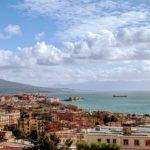
Francesca Ciampa (Italy) cooperated with Carla S. Ferreira (Portugal) virtually as the STSM was not possible to undertake in other way than due to COVID pandemics. The topic of the mission was Stakeholders engagement between retention flood strategies and life cycle of anti-flooding technology solutions.
The output of the mission is the joint paper titled “Flood Mitigation in Mediterranean Coastal Regions: Problems, Solutions, and Stakeholder Involvement” published in Sustainability.

Michal Pástor (Slovakia) visited Global Change Research Institute CAS in Brno, Czechia. Together with Jiri Jakubinsky they worked on the synthesis of the current knowledge to characterize the status of floodplain ecosystems, their main stressors and management responses across Europe.
The output of the STSM will be join paper titled: Floodplain management as a tool supporting multiple ecosystem functions and services.

Paul Hudson (Germany) spent two weeks at Jan Evangelista Purkyně University in Ústí nad Labem focusing on the cost-benefit analysis of changing property rights in flood-prone areas. The core objective of this STSM was to begin the work towards a scientific paper with the use of Czech case study. Further, the presentation at the international conference held in Usti nad Labem was undertaken.
An agreement to complete the following joint paper: Hudson, P., Raska, P., Machac , J. Slavikova, L. An evaluation of the implications of land-use change for urban regeneration and flood risk, for the target journal Land Use Policy. This paper uses the work started in the STSM as a starting point.
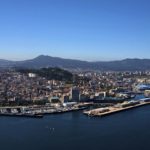
Weronika Marynowska (Poland) visited University of Vigo in Spain. The purpose of the mission was to investigate the possibilities of game theory application to the issues related to flood risk management. During STSM the preparatory work the LAND4FLOOD Early Career Investigators book chapter was undertaken.
The join book chapter A cooperative game for river flooding risk prevention will be published.
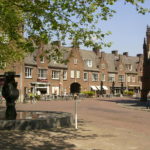
Besmira Dyca representing United Kingdom run her STMS at Wageningen University (The Netherlands). Together with Thomas Hartmann she investigates Dutch blue/green infrastructure projects implemented for the flood risk mitigation. The goal was to scrutinized how property rights are dealt with by analyzing the institutional and legal arrangements in place, as well as property based financial mechanisms that capture part of the incremented value of the land and facilitate a fair distribution of costs and benefits in specific projects.
Joined paper shall be published: Dyca, Hartmann: Can active land policy translate into land for flood? An analysis of private property in the realm of land value capture”.

Gregor Johnen (The Netherlands) were hosted by University of Ljubljana (Slovenia) for almost one month. Together with Nejc Bezac he applied combined modelling approach and a cost-benefit analysis (CBA) to evaluate impacts of afforestation on peak river flows and on selected ecosystem services within the Glinščica river catchment in Slovenia.
Results of the collaborative field work will be present in EGU 2020 in Vienna. Also, the book chapter titled “Nature Based Solutions for Flood Mitigation: environmental and socio-economic aspects” is in preparation.
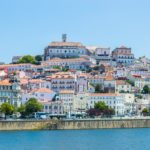
Milan Gazdic (Serbia) spent three weeks at Escola Superior Agrária de Coimbra (Portugal) to investigate role of green infrastructure on water regulation within cities using the local case study. Gathered information will be used for the writing of the book chapter.
Abstract Effectiveness of green areas and the impact of the spatial pattern on water infiltration within cities was submitted to a conference.

Cygal Pellach (Israel) together with Prof. Esther van Zimmeren (University of Antwerp, Belgium) explored the role and process of amendments to statutory plans in flood risk management in Flanders. She carried out interviews with nine academics, national and local government officials during her stay.

Arthur Schindelegger (Austria) visited Israel for conducting some field research in November 2019. Based at the Ministry of Agriculture in Tel Aviv he worked closely with Jenia Gutman, PhD and receiving additional support from Prof. Rachele Altermann (Technion, Haifa). As Israel is facing challenges in its flood management due to the rapid urban growth, Arthur Schindelegger conducted interviews at different public authorities to identify perspectives, policies and potentials for integrating flood risk management increasingly in spatial planning.
A collaborative paper with colleagues from Israel on the status quo in flood risk management is in preparation and an additional publication including a comparative perspective on keeping retention areas free of development is planned.

Lenka Slavíková (Czech Republic) visited Thomas Hartmann from the Wageningen University to finish the special issue for Environmental Hazards called Financial Schemes for Resilient Flood Recovery (to be published during 2020) focused on linkages among recovery financing (insurance, governmental aid, buy-outs) and vulnerability reduction. Editorial for this special issue was compiled.
Join paper on paradoxes of resilient recovery (Slavikova, Hartmann, Thaler) will be submitted to Wires Water.

Zuzana Németová (Slovakia) cooperated with Prof. Kazimierz Banasik from the Department of Water Engineering of Warsaw University of Life Sciences (Poland). The mission aimed at the modeling of soil water erosion – in particular the application of a physically-based Erosion-3D model in the new territory situated in the central Poland. The cooperation further continues and aims at long-term outputs.
 Marijana Kapovic Solomun (Bosnia and Herzegovina) visited Faculty of Forestry, University of Belgrade (Serbia) to investigate the perceived role of forests in flood mitigation. She reviewed existing institutional structures and legislative frameworks and started to collect on-line stakeholder questionnaires.
Marijana Kapovic Solomun (Bosnia and Herzegovina) visited Faculty of Forestry, University of Belgrade (Serbia) to investigate the perceived role of forests in flood mitigation. She reviewed existing institutional structures and legislative frameworks and started to collect on-line stakeholder questionnaires.
In future, results of the STSM will serve as an important base for the join scientific paper.
 Karin Snel (The Netherlands) spent more than two month at Flood Hazard Research Centre of the Middlesex University in London, working with Sally Priest. She focused on the instruments and communication needs for encouraging the uptake of individual risk resilience measures. The intended research considered the English socio-political context and instruments, and their use for the incentivising individual risk reduction.
Karin Snel (The Netherlands) spent more than two month at Flood Hazard Research Centre of the Middlesex University in London, working with Sally Priest. She focused on the instruments and communication needs for encouraging the uptake of individual risk resilience measures. The intended research considered the English socio-political context and instruments, and their use for the incentivising individual risk reduction.
Join paper on the perceived responsibility of British residents summarizing results of 22 interviews is in preparation.
Results were also presented at the AESOP 2019 conference.

Valentina Nikolova (Bulgaria) spend two weeks at the Faculty of Geography at the University of Belgrade (Serbia) clarifying the role of fluvial geomorphology in flood risk management and methodology of flood susceptibility assessment. She undertook review of scientific publications of Serbian geomorphologists and discussed the appropriate methodology for measuring erosion processes in river basins during floods.
The goal of the mission was to exchange ideas for project cooperation among Serbia and Bulgaria in future.
 Miroslav Bauer (Czechia) visited Lancaster Environmental Centre (England) to exchange knowledge on sediment transport and nutrient transfer measurement during floods. He worked together with prof. John Quinton.
Miroslav Bauer (Czechia) visited Lancaster Environmental Centre (England) to exchange knowledge on sediment transport and nutrient transfer measurement during floods. He worked together with prof. John Quinton.
Join paper: Soil erosion and flood mitigation in CZ and UK – comparison, discussion and lesson learned.
The abstract was sent to the XIX. International Multidisciplinary Scientific GeoConference SGEM 2019.
 Mariana Madruga de Brito (Germany) visited the department of Statistics and Operational Research, and the Department of Forest Engineering of the University of Vigo in Spain. With the support of Dr. Juan Vidal Puga she undertook the systematic literature review of papers that apply game theory for solving flood risk management problems. STSM also served as an opportunity to foster collaboration between researchers at the University of Vigo and University of Bonn.
Mariana Madruga de Brito (Germany) visited the department of Statistics and Operational Research, and the Department of Forest Engineering of the University of Vigo in Spain. With the support of Dr. Juan Vidal Puga she undertook the systematic literature review of papers that apply game theory for solving flood risk management problems. STSM also served as an opportunity to foster collaboration between researchers at the University of Vigo and University of Bonn.
Join paper summarizing results of the review is in the preparation.

Peter Davids (Belgium) spent two weeks at BOKU Vienna to collect data about the Austrian floodlabel institutional framework. This was done via interviews with flood risk experts with the support of Dr. Thomas Thaler. A floodlabel for houses is currently in development to encourage adaptive behavior of private homeowners. This label is meant to inform homeowners on flood risks and enable implementation of risk mitigation measures to reduce impacts of future hazards events. In future the collected data will be compared to the case studies of the Netherlands and Belgium.
Join paper titled Tailor-made risk communication and advice for homeowners: how we can encourage adaptive behavior in is preparation.

Weronika Warachowska (Poland) came to Ústí nad Labem in Czechia to work on the join research paper on relations between flood risk perception and individual flood mitigation measures undertaken. Her goal was to analyze survey data from two Czech flood prone municipalities. She was supported by Assoc. Profs. Pavel Raška and Lenka Slavíková.
Join paper titled Flood risk reduction between desired state and daily practice: Results from flood risk perception survey in two Czech municipalities will be submitted to international journal.

Laszlo van der Wal (The Netherlands) with the support of Dr. Lukas Löschner (BOKU Vienna) investigated the degradation of existing hydraulic infrastructures and the dynamics of their renovation or replacement at Vienna’s Donau (Danube river). The understanding of how (hydraulic) infrastructures interact with geology, socio-cultural or institutional aspects is still limited. Therefore, the STSM was focused on data collection along two 18 kilometre long sections along the Donau.
The results of the STSM were submitted as an abstract for presentation at AESOP 2019 in Venice.

Safira de la Sala (Izrael) worked with Prof. Marleen van Rijswick (Head of the Utrecht Centre for Water, Oceans and Sustainability Law, the Netherlands) on the Dutch case study developed within her dissertation titled “Property Rights in the Climate Change Era: Comparative Analyses of Responses to Sea-Level Rise”.
Join paper with Prof. Alterman and Prof. van Rijswick is in preparation.

David Ch. Finger (Iceland) visited colleagues in Slovenia to investigate the perception of local farmers of adhering to a sustainable land management in order to increase the flood retention on their lands. Together with Vesna Zupanc he planned survey with farmers to produce comparative data sets from Iceland, Slovenia, Serbia and Bosna and Herzegovina.
Preliminary results from the survey will be presented at the South-European LAND4FLOOD workshop. Joint comparative paper is in preparation.

Jan Macháč (Czech Republic) spent one month at the Wageningen university (the Netherlands) developing the experimental approach to flood protection using negotiation between upstream and downstream actors. The preliminary design of the experiment was supervised by Thomas Hartmann.
Output: Abstract for the international conference Empowering Hydro-diplomacy (Hague, October 2018) was submitted based on the literature review and the experiment desing undertaken during the STSM

Aleksa Lipovac (Serbia) visited the Reykjavik University (Iceland) to continue in the research on natural water retention measure potential started by Alexandra. He cooperated with David C. Finger and Guðmundur Halldórsson, member of The Soil Conservation Service of Iceland.
Output: Paper on Flood Retention on Private Land in Iceland will be presented at EGU 2018 in Vienna
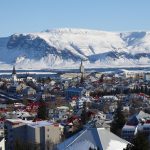
Alexandra Figurek (Bosna and Herzegovina) visited the Reykjavik University (Iceland). Together with David C. Finger she worked on the topic Stakeholder Involvement in Implementing Flood Protection Measures on Private Lands. She contributed to the stakeholder analysis focused on the acceptance of natural water retention measures in Iceland.
Output: Paper on Flood Retention on Private Land in Iceland will be presented at EGU 2018 in Vienna
